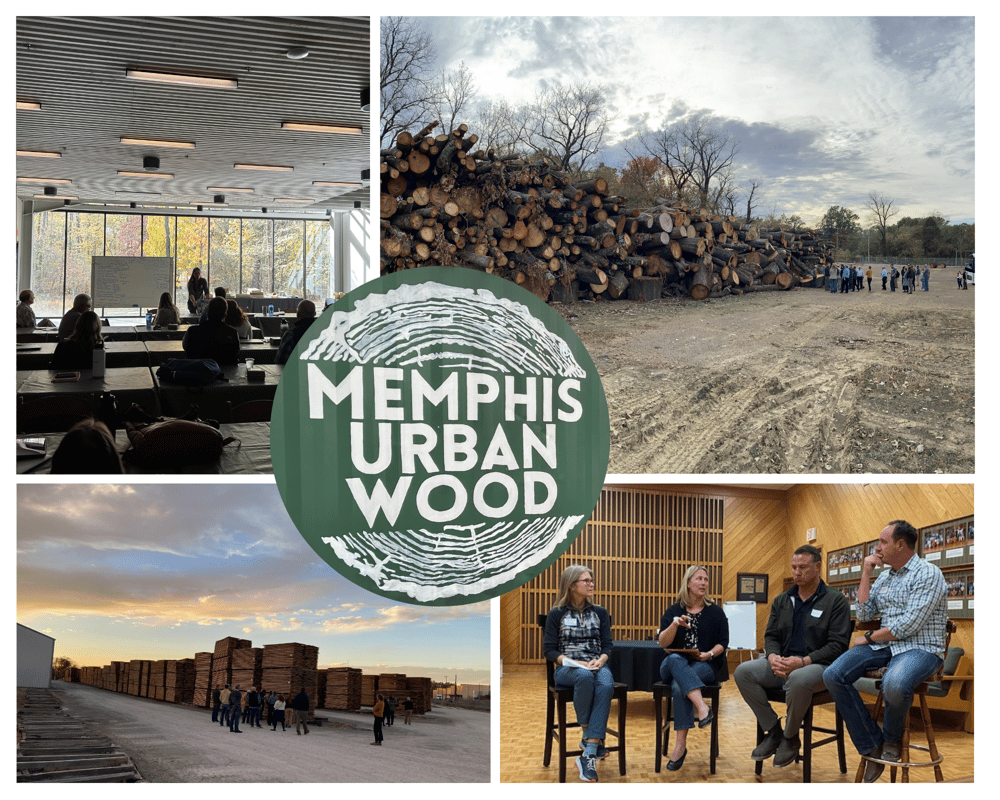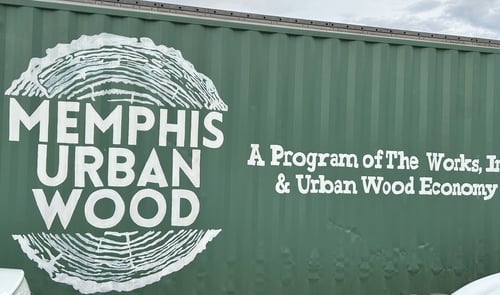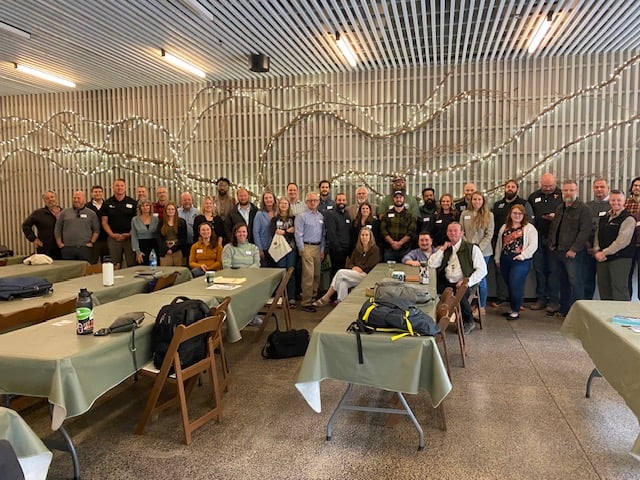
Participating in the Urban Wood Academy
Sustainability, wood, urban wood, Urban Wood Economy, Room & Board, Deadwood Revival Design, Woodland Tree Service, Street Tree Revival, Memphis Urban Wood, forestproud

Sustainable Furnishings Council was invited to Memphis, Tennessee to participate in the Fourth Annual Urban Wood Academy. By invitation only, fifty or so people from around the country and from all aspects of the wood and forestry industry gathered for a 2-day learning event focusing on key components in the urban wood movement. It was my first time in this arena, but one that I am increasingly passionate about. I wanted to learn more about this industry for myself and the SFC members who manufacture wood furniture and supply wood components and for the buyers who drive the supply chains.
What is Urban Wood? Sounds very trendy and almost like a fashion brand. Urban wood is the tree canopy found in urban settings. Your town, city, or municipality. Trees in parks, neighborhoods, streetscapes. Trees growing in and bordering parking lots and sidewalks. Any tree that is surrounding you in an urban setting is an urban tree. And up until now, only a handful of years ago, there was no real plan or value assigned to these trees at the end of life.
A pilot project called The Baltimore Wood Project got underway in 2017. The USDA Forest Service played a big role, led by Research Forester Morgan Grove, after working with the City of Baltimore since 2012 to find solutions to the problem of Baltimore’s trees going to the landfill as well as the amount of housing material (wood siding and flooring, etc.) generated from the demolition of 4,000 Baltimore's row houses scheduled to end up in the same place - the trash. The project's lofty goal was "to create a diversified and regional wood economy pilot which could promote sustainability, create jobs – especially for people with barriers to employment—and improve lives" of the people and families who lived in urban areas.
What is the end of life for trees in an urban setting? You've seen it. Trees cleared for the development of another strip mall, housing project, or grocery store. Trees on your street or in the neighborhood park that have aged out or grown so big the decision to cut them down is the best way to manage them. From there, they're usually hauled off to be burned or landfilled.
As an aside, I know some of our readers like me are tree lovers, conservationists, and environmentalists. For most of us, it's hard to watch "good trees" come down sometimes. The opening remarks from Jeff Carroll, CEO of the Urban Wood Economy, and the organizers of the Academy, helped me feel better about this - remember, a lot of us come from outside the forest or development industries - and these words have helped me put it all in perspective. Mr. Carroll said:
.png?width=600&height=200&name=Wood%20Conference%20Blog%20(2).png)
It is good to sit with this for a minute. He then introduced the concepts of TRUST, and “COOP-itition” (an amalgam of the words cooperation and competition) for the group and the industry at large to consider. The wood industry, standing in status-quo arborist and forestry traditions, must start to think in new ways, work alongside each other, and see urban wood as a valuable resource for the good of the community, treat it as such, and get it to the right places (of business) to do that.
Many of the Urban Wood Academy participants are businesses already doing this. In California, Street Tree Revival and SFC Member Deadwood Revival Design, both woodworker and lumber companies, are working exclusively with urban trees and milling them into usable lumber and slabs to make beautiful one-of-a-kind furniture pieces. Another lumber company in Georgia, SFC Member Eutree, is doing the same. Eutree’s website states they help "urban tree services divert beautiful hardwood specimens from becoming waste." They promote their products as "Forest Free." This is a brilliant play on words used as part of their mission statement.
Room & Board is a company that has embraced urban wood wholeheartedly. This Minnesota based retailer, a founding member and sponsor of SFC, is known for their simple, modern, and elegantly designed furniture lines. They were invited to the proverbial urban wood table by the USDA Forestry Service in 2018 because of their commitment to sustainability and their willingness to innovate. They said YES to experiment and incorporate urban wood and the lumber board-feet coming out of the Baltimore row houses because they saw the potential for beautiful and unique furniture products (rare white oak!) while addressing some of the city's socio-economic issues. And this year at the Urban Wood Academy, I sat on a panel with Emily McGarvey, Director of Sustainability for Room & Board. Emily spoke about their stellar achievements in urban wood utilization. I asked her for a summary to share with you here:
Room & Board kept the equivalent of over 300 trees out of the waste stream in 2023; our goal is to divert the equivalent of 1,000 trees annually by 2025. We'll reach our goal by adding more cities to our Urban Wood Project, increasing the number of products offered and working toward more dimensional lumber availability for high-volume items like dining tables.
In 2023, we added New York City to our growing list of cities that include Anaheim, Baltimore, Detroit, Minneapolis, and Sacramento. We are partnering with Brooklyn-based millwork and design group, Tri-Lox, to upcycle wood reclaimed from decaying New York City water towers to create the Artemis, Milbridge, and Stanley collections.
Our best-selling Montego outdoor collection has a sustainable new option: thermally modified ash. The ash is both reclaimed as part of our Urban Wood Project in Minneapolis and harvested from sustainably managed U.S. forests, giving Montego a special origin story.
We partnered with (SFC Member) Cambium Carbon and Wood Castle to use wood from old orchards to form these unique coffee tables in the Graft collection. Our grafted walnut comes from trees in a northern California orchard that were at the end of their lifespans. The trees were a result of grafting English and American walnut, producing dramatic color variation within each piece of lumber.
And finally, for now, like icing on the cake, Emily announced that Room & Board has started tree planting in local communities. "We are proud to partner with The Arbor Day Foundation and their Alliance for Community Trees® program which focuses on Urban forestry and tree planting in communities with the greatest need. In 2023, we've supported tree planting in Baltimore and Detroit."
Bravo to Room & Board!

The Room & Board team at the Urban Wood Academy in November:
Gene Wilson, VP of Merchandising & Vendor Management; Emily McGarvey, Director of Sustainability;
and Megan Meyer, Director of Vendor & Product Management

One of the highlights in Memphis was a field trip to see many of the concepts of the urban wood industry being put into action. The Urban Wood Economy revealed the plan for a new start up with huge potential to scale infrastructure in Memphis and the east coast, even referencing the Mississippi River as a way to get good urban wood products to other areas of the country. Memphis Urban Wood is that start-up. The academy participants toured a mostly empty but paved multi-acre site, but we got the sense of the future layout with a couple of things in place: the marked off section where the sawmill would go in a few weeks' time, the starter pile of urban wood logs - check this out in the top photo (supplied by another urban wood advocate in Memphis: Terran Arwood, the owner and President of Woodland Tree Service), and the air-curtain burner that will handle tree branches, leaves, and trunks that can't be planed down due to rot or size, to create another product with a revenue stream at Memphis Urban Wood: Biochar. Read more about biochar here, in a well written LinkedIn post by Kathryn Reis, a fellow Urban Wood Academy participant.
The holistic combination of whole tree utilization, giving underserved people training and well-paying jobs, and creating products that are useful, beautiful, and marketable, gives complete value to the process and creates a circularity loop that cannot be ignored. Urban wood utilization does not cause deforestation and does not contribute to climate change but in fact improves the carbon situation by sequestering carbon into the wood material - be it lumber to create flooring or a bookcase for your home, or biochar which is being studied to improve ground and soil conditions on farms and flooded land.
I am eager to see Memphis Urban Wood grow.
Since the inception of Sustainable Furnishings Council in 2006, the organization has recognized that the home furnishings industry consumes a lot of wood and has offered education around the material of wood; helping companies identify and choose wood sources that do not contribute to deforestation. And since 2018, the Wood Furniture Scorecard program has assessed retail companies on their wood sourcing policies for the furniture they purchase and sell. Identifying means asking: 'where are these trees grown, how are they selected, and are they cut under a certification that provides systems for forest preservation and management?' Implementing a wood sourcing policy means making responsible choices based on the answers of where the wood is coming from. And companies are given more points if they report purchasing more certified wood and EQUAL weight and points are given to the category of recycled or reclaimed wood, under which urban wood falls. This year, the scorecard methodology added the term ‘urban wood’ to the definition of recycled or reclaimed wood.
Are we witnessing a pioneering step in managing the climate crisis? Watching local businesses, communities, and governments start to shift the way the urban tree canopy is valued and put to use is a very proactive, and perhaps pioneering step. Our hope is that more companies in the home furnishings industry start to prize these trees for their value too. As the infrastructure ramps up and more sources of urban wood are available, SFC will continue to have conversations with manufacturers and makers to design furniture, make prototypes, test production, and bring more urban wood pieces to market.

Participants of the 2023 Urban Wood Academy
Photo by Jennifer Judd, Director for Partnership & Outreach, Urban Wood Economy

Program Director

